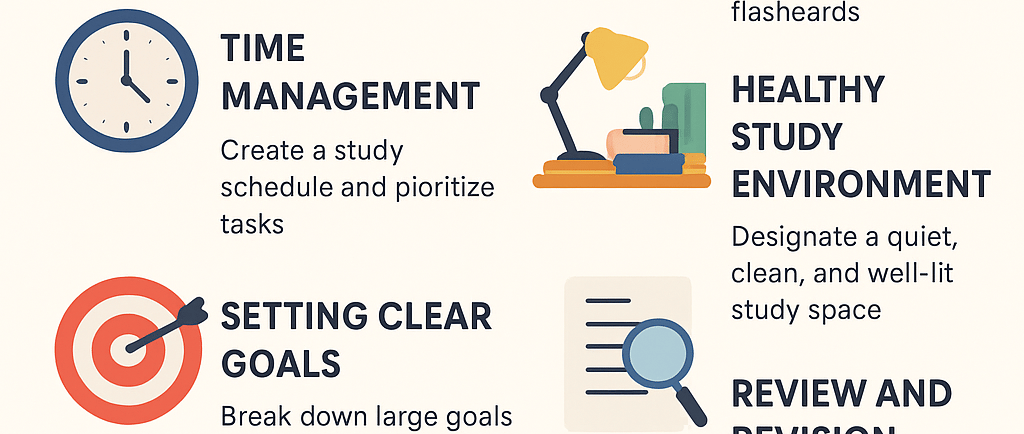Best Learning Habits For Students


Best Learning Habits for Students
1. Consistency Over Intensity
Studying for long hours in a single stretch often leads to burnout and poor retention. Instead, consistent study sessions every day build a stronger memory. For example, studying one hour daily is far more effective than studying six hours at once before an exam. Regularity keeps the brain engaged and reduces stress.
2. Active Learning
Simply reading textbooks is not enough. Students should engage with the material actively. This can include summarizing lessons in their own words, teaching the concept to a peer, or creating mind maps and flashcards. Active learning improves understanding and makes recall easier during exams.
3. Time Management
One of the key habits of successful students is managing time wisely. Creating a study schedule and prioritizing tasks ensures that every subject gets proper attention. Tools like planners, calendars, or mobile apps can help students stay organized. Following the “Pomodoro technique” — 25 minutes of focused study followed by a short break — also enhances productivity.
4. Healthy Study Environment
Distractions can reduce focus drastically. Students should designate a quiet, clean, and well-lit study space. Keeping away from mobile phones and social media during study time is important. A positive environment signals the brain that it is time to learn.
5. Setting Clear Goals
Without clear goals, students may lose motivation. Breaking down large goals into smaller, achievable tasks makes the process less overwhelming. For example, instead of saying, “I will finish the whole chapter today,” one can say, “I will complete two topics in the next hour.” This approach builds momentum and confidence.
6. Review and Revision
Learning without revision often leads to forgetting. Regularly reviewing past topics strengthens long-term memory. Weekly revisions, solving practice questions, and testing oneself are excellent ways to ensure knowledge stays fresh.
7. Balanced Lifestyle
Academic success is closely linked with physical and mental health. Adequate sleep, exercise, and a balanced diet improve concentration and memory. Students who compromise on sleep often experience reduced alertness and poor problem-solving skills. A healthy body fuels a sharp mind.
8. Asking Questions
Curiosity is a powerful learning habit. Students should never hesitate to ask questions in class or seek clarification from teachers and peers. Asking questions not only clears doubts but also deepens understanding of the subject.
9. Positive Mindset
Lastly, a positive attitude plays a vital role. Students who believe in their ability to learn are more likely to stay motivated and persistent. Viewing challenges as opportunities for growth builds resilience and confidence
Conclusion
The best students are not necessarily the most intelligent but those who practice effective habits. By being consistent, managing time, engaging actively with lessons, and maintaining a healthy lifestyle, students can achieve their full potential. Good learning habits are not built overnight but through daily discipline and dedication.
